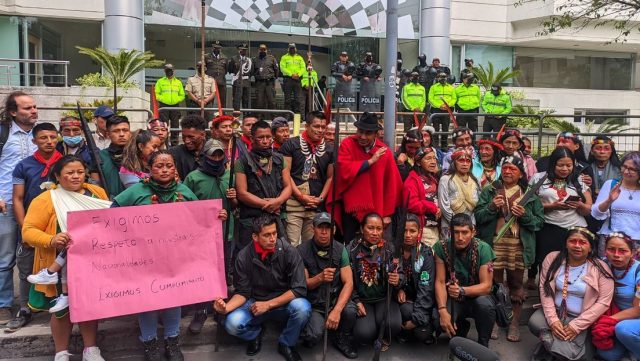Indigenous people of the Waorani and Cofán ethnic groups of the Ecuadorian Amazon filed an appeal before the Constitutional Court, in Quito, to demand compliance with the sentences issued in their favor in 2018 and 2019, which protect thousands of hectares from the interests of the mining and oil companies.
“We are here to ask (the judges) to wake up, to make them comply (the sentences). It is done, the only thing we want is for it to be fulfilled», said the president of the Waorani nationality, Gilberto Nenquimo, in front of the headquarters of the Constitutional Court.
Nenquimo added that they did not come to Quito to «annoy» the Constitutional Court. “We come to make a demand that is in the Constitution. We come from our territory because the State has not fulfilled its obligations. We want them to stop lying to us», he claimed.
For his part, Gaba Guiquita, also of the Waorani ethnic group, pointed out that in 2019 they gave the Court the document that records their victories in the sentences. “Now we are here to make them comply. The State violated our territory, now it has to comply with the reparation», emphasized Guiquita.
“With the sentences we thought we had achieved justice, but four years have passed without due compliance”, said Andrés Tapia, communication director of the Confederation of Indigenous Nationalities of the Ecuadorian Amazon (Confeniae).Cofán case
In relation to the Cofán case, in October 2018, in a second instance ruling, the Provincial Court of Justice of Sucumbíos, in northeastern Ecuador, ordered the reversal of 32,000 hectares of 20 mining concessions granted without prior consultation with the community of Sinangoe, explains journalist Edgar Romero for RT.
The court, in addition to reversing all the concessions that were operating, canceled the granting of those that were in process, which were 32. It also ordered the Ministry of Environment, Water and Ecological Transition (MAATE), the environmental restoration of the entire area affected by the mining activity.
However, the Ministry of Energy only suspended the concessions, without reverting them to the State; while the MAATE has not carried out any environmental restoration action in the area, according to the complaint of the Confeniae.
“We demand that the Constitutional Court comply with the reversal of the concessions and comprehensive reparation. This is very important because we make use of the river, of the food that the Aguarico provides, we have always fished there», claimed Wider Guaramag, president of the A’i Cofán community of Sinangoe.Waorani case
Regarding the case of the Waorani, in April 2019, the Court of Criminal Guarantees of the province of Pastaza, in the east of the country, ruled that the State violated their rights to free and informed prior consultation and to the self-determination of the plaintiff communities, in relation to a tender for the oil block number 22, which affects some ancestral territories.
The court recognized that the communities were not consulted in 2012 about the future bidding for this block, which, according to the Amazon Frontlines organization, is close to 200,000 hectares in size and overlaps 16% of the territories of 16 Waorani communities.
The Government, through the Ministry of the Environment, appealed the decision; however, the sentence was ratified by the Provincial Court of Pastaza, thus vetoing the entry of oil companies into the territory of the Waorani indigenous community.
The ruling also ordered an investigation of the officials who were in charge of the prior consultation process, as well as the continuous training of the officials of the MAATE and the Ministry of Energy and Mines for the understanding of collective rights, procedures for prior consultations, free and informed and Waorani worldview.
According to the Confeniae, this training, which must be carried out with the respective participation of the communities, «did not occur»; nor was the investigation carried out on the officials who committed the violation against the indigenous people.
“We resort to the Constitutional Court because the ministries do not listen to the provincial judge. We hope that in addition to enforcing the sentences, disciplinary processes will be carried out for non-compliance», said Jorge Acero, a human rights defender and lawyer for the Cofán community of Sinangoe, on Tuesday.Topic within the dialogue in Ecuador
The president of the Confederation of Indigenous Nationalities of Ecuador (Conaie), Leonidas Iza, who accompanied the representatives of the Waorani and Cofán communities to the Constitutional Court, said that the issue of non-compliance with these rulings was included in the dialogue that is taking place between the indigenous movement with the national government, which was installed after the strike last June.
Iza specified that the topic is included in «Table 5», referring to «Energy and natural resources», of the 10 that were established to deal with different problems.
He said that, in addition, «the mechanisms of respect for constitutional rights and at the international level have been presented» at «Table 6», in which «Collective Rights» are discussed.
The Constitution of Ecuador establishes, in its article 57, 21 collective rights to the communes, communities, peoples and indigenous nationalities. Among them are «preserve the imprescriptible ownership of their community lands, which will be inalienable, unseizable and indivisible», «maintain possession of the ancestral lands and territories and obtain their free allocation», «participate in the use, usufruct, administration and conservation of the renewable natural resources found on their lands», as well as «prior, free and informed consultation […] on plans and programs for prospecting, exploitation and marketing of non-renewable resources found on their lands and that may affect them environmentally or culturally».


